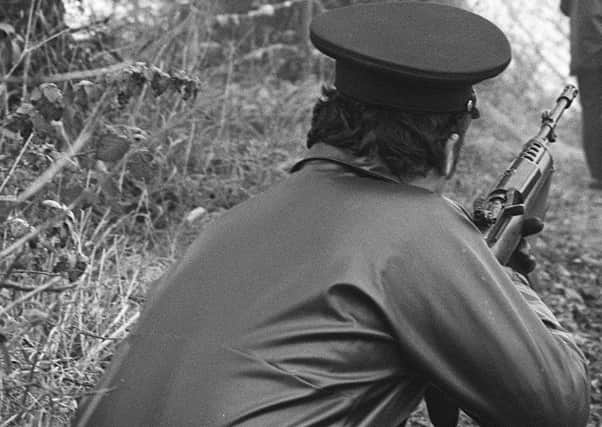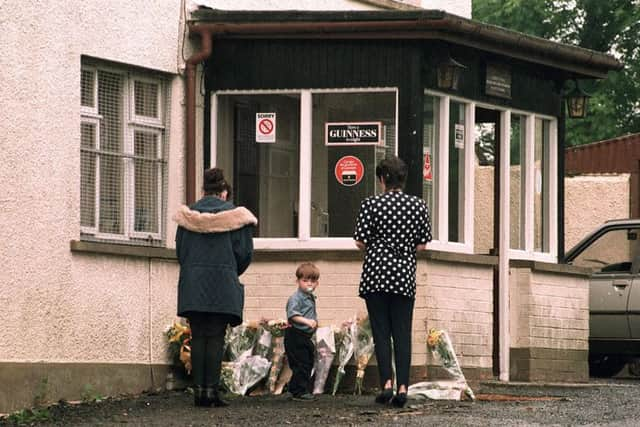Ex-Special Branch officer: Why we did what we did with informers


Last week, the Police Ombudsman for Northern Ireland (PONI) concluded that the RUC colluded in the murders of six men in a bar in Loughinisland in 1994.
To date, every PONI report into alleged collusion has reached similar conclusions and a pattern has begun to emerge.
Advertisement
Hide AdAdvertisement
Hide AdThe allegations are widely spread across police departments and certain individuals and go something like this. CID (and by extension, the SIO) get a hiding for a poor investigation which Dr Maguire describes as “not meaningful” and lacking in thoroughness and motivation.


Frankly, I have little love for the old “C” department of the RUC as it was and by whom it was staffed at senior level, however one thing is for sure; that most CID detectives could be characterised as people who “lived the job”. In short therefore, I don’t recognise the description of the CID effort, in the terms used by Dr Maguire.
When he almost reluctantly adds a one-liner in his report, acknowledging the desperate times in which these murders occurred and the enormous case-load of heinous crimes which CID were expected to deal with, he does so with brevity which suggests very little consideration has been given to the contextual dangers and difficulties faced by the RUC at that time.
He supports the contention of the families of the deceased, that CID disposed of the getaway vehicle too early, on the ridiculous premise that new scientific investigative methods may have been invented subsequently. By this rationale, no physical evidence will ever again be properly or duly disposed of, once all available evidence has been retrieved from it. Based on this logic, what period, I wonder, would be appropriate; a decade, a century?
Advertisement
Hide AdAdvertisement
Hide AdThe FRU/MI5 (also referred to within the trade, as “Box”) come in for a fair dose of criticism, mostly around their handling of Brian Nelson and his role in the procurement and importation of weapons from South Africa, one of which was subsequently used in the Loughinisland shooting.


Whilst the general public can hardly be expected to understand the strategic imperative to encourage an intelligence source into a terrorist operation for which he then subsequently becomes partially responsible; but Michael Maguire should, or he should not be in his current position.
If Ulster Resistance (UR) intended to buy guns on behalf of and for distribution to the UDA and UVF, any intelligence agency tasked with protecting public safety which had an opportunity to gain access to and control of this transaction would surely grasp it with both hands. Maguire criticises RUCSB also, for having agents in senior positions within the UDA who encouraged and even directed the actions of Brian Nelson. What sort of agents would they be and what manner of handlers if they failed to encourage any actions which would bring this cache under their control?
The PONI acknowledges in the briefest terms the overarching objective of the intelligence agencies to be the seizure of the weapons and the arrest of leading loyalist terrorists in possession of them. He fails to consider the additional benefit that such a success against UR/UDA/UVF would have represented, in terms of the disruptive effect on these organisations and the achievement it would have been for law enforcement. As with all similar PONI investigations and reports, they fail utterly to consider that intelligence work is a long game.
Advertisement
Hide AdAdvertisement
Hide AdThat FRU/Box have some questions to answer with regard to their handling of Nelson and, in particular, their lack of control over him in this case and others, such as the Finucane murder and Adams attempted murder, is not in dispute. To question, however, the strategic value of running agents into this procurement operation, in a manner as to suggest a malign motivation, is alarming. There are many in society who will gladly cheer for anyone who shouts “collusion” and the Ombudsman’s report has received a warm welcome in many quarters.
Having dealt with the issue of the motivation of FRU/Box/RUCSB to penetrate and exploit this weapons procurement operation, let’s move on to the constant refrain that either to hamper CID investigations or simply to protect sources, SB failed to pass on intelligence which may or may not have been of material benefit to CID.
I suspect that the intelligence regarding the actual commission of the murders was so scanty and perhaps even conflicting that the intelligence agencies were reluctant to send their overworked CID counterparts on a series of wild goose chases. It was a regular feature of intelligence work that a single intelligence lead would be withheld from investigators due to a lack of provenance, or an unreliable source. On many occasions, this proved to be a wise decision, as subsequent corroborated intelligence leads from tried and trusted sources took the investigations in a different direction entirely.
In contemporary intelligence operations, all intelligence product is immediately shared with SIOs whether it is deemed to be reliable or not. This flawed strategy often results in mistakes and red herrings, as the entire range of intelligence is dumped on the desk of the unfortunate SIO, who is then forced by protocol to send his minions on meandering and misleading enquiries.
Advertisement
Hide AdAdvertisement
Hide AdIn essence, though, throughout all the PONI reports into or including RUCSB, what Nuala, Al and Michael have failed to grasp, is the fundamental difference between other officers and SB detectives from top to bottom, during the pressure-cooker days of the Troubles, in terms of motivation and objectives. Ultimately, MI5 and RUCSB were charged with the task of protecting the state of Northern Ireland from a concerted campaign of terrorism and insurgency, which threatened its very existence. It did so by recruiting, handling and promoting into positions of influence within terrorist organisations a network of agents, spies, touts, informants, sources or CHIS; call them what you will.
A dead source is no use. A source who is incarcerated for his part in a crime which he dutifully reported on for our benefit is also of no use. A source who has become suspected by his terrorist comrades of “touting” is no use. A source who is moving down through the ranks, out of contention and away from a position of access, is of less use than one who is on the rise.
For the record, good intelligence sources rarely grow on trees. Hence, those who are well placed, active, motivated and open to effective control by their handlers are rather like hen’s teeth and very little chance would be taken with their best interests. I’ve said it before and I’ll say it again; when you’re on the other side of the Sunday World perspective of “touts” and “informants”, you can easily see how, when forced to make a no-win choice between the certain loss (or execution) of a valuable source and a possible innocent casualty, the lines of right and wrong, the value of life and lives to be saved in the future, can become blurred.
The PONI contention that following the partially successful “E” department operation to seize the imported weapons and arrest two senior UDA members, the RUCSB should have somehow guessed the intended destination of the remainder of the shipment borders on delusional. Maguire suggests that RUCSB might have been expected to conclude that James Mitchell’s farm, some 20km away in south Armagh, was the hide; and pass this utterly astonishing piece of guesswork on to CID. Indeed to this day, as far as I’m aware, there’s absolutely no evidence that the remainder of the shipment ever did darken Mitchell’s door. This, therefore, represents mere speculation, used to reach a conclusion which justifies the allegation.
Advertisement
Hide AdAdvertisement
Hide AdThe assertion also that RUCSB sources “involved in murder and conspiracy to murder” have not been “subject to any meaningful investigation” surely begs questions. Questions such as; if there is evidence of such crimes, sufficient to make the allegation, then there must be proof sufficient to arrest and charge them.
Where then, are these arrests and charges; where are the inevitable results of the evidence of crimes uncovered by PONI? One imagines that having enough evidence of murder and conspiracy to murder to make the allegation, they (PONI) must have shared these revelations with the PSNI for investigation. If not, why not?
The continued seizures of these weapons, explosives, ammunition and equipment in subsequent SB intelligence-led operations strongly suggests that the intelligence agencies in Northern Ireland had every intention of controlling and seizing the entire shipment. His lack of understanding of the myriad of operational pitfalls and potential stumbling blocks during a surveillance operation is difficult to understand.
The reality is that well-meaning professionals are subject to unfortunate circumstances and normal human failings. Clearly, mistakes were made prior to this unfortunate incident and in its aftermath, but to characterise this as a deliberate attempt to assist terrorists to commit murder is grossly untrue.
Ombudsman’s Office defends report
Advertisement
Hide AdAdvertisement
Hide AdResponding to the retired Special Branch officer’s article (above), the Police Ombudsman’s Office last night defended both its report into the Loughinisland attrocity and its wider work.
A spokesman for the Police Ombudsman’s Office said: “Our report was ‘fact checked’ and accepted by the PSNI.
“I would urge your contributor to read it again. On several occasions he misquotes from it.
“We did not say that Special Branch deliberately armed the terrorists.
Advertisement
Hide AdAdvertisement
Hide Ad“We said very clearly we found no evidence to support such a suggestion.
“Nor did we criticise the principle of the use of informants: in fact we commended their use in the seizure of weapons. As for the issue of collusion, we chose to apply the particular definition accepted by the PSNI.”
• A fuller response from the Police Ombudsman will be carried in tomorrow’s News Letter.